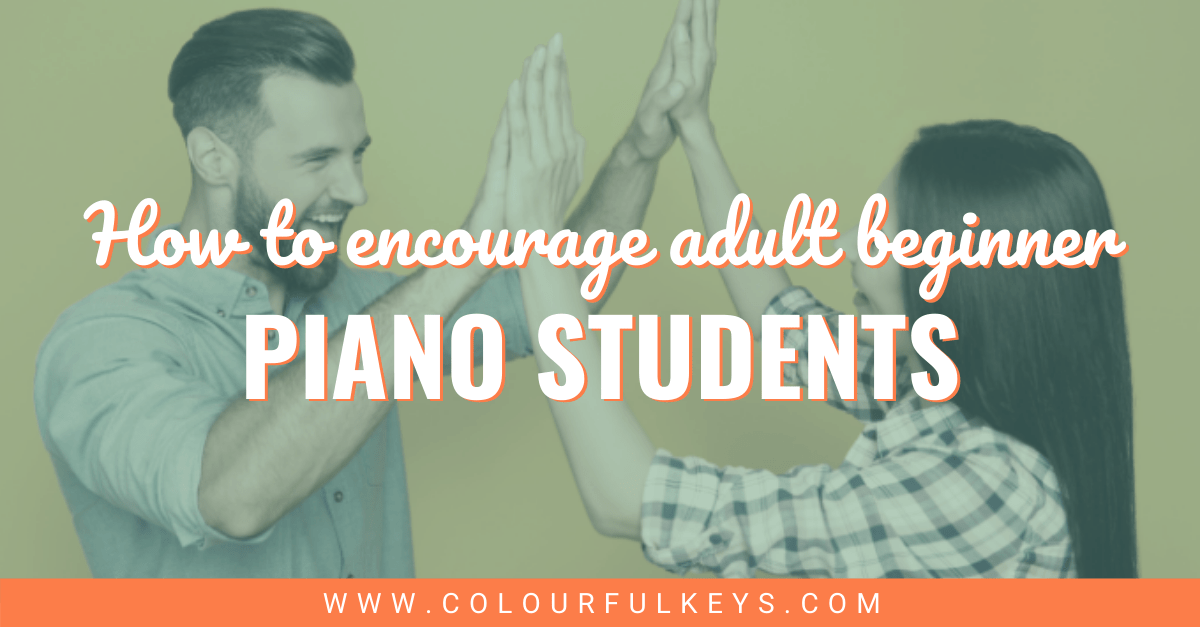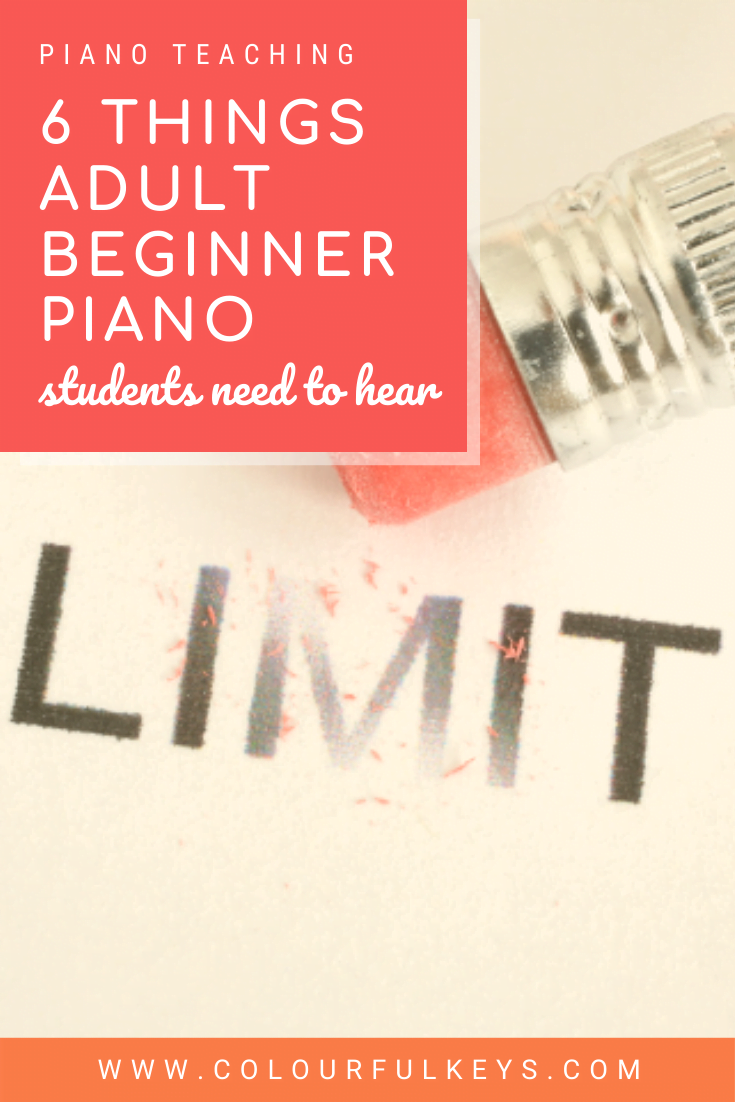I’ve been working with adult beginner piano students for many years now and there are certain issues which come up again and again. These limiting beliefs and mental missteps can really hold students back, and I believe it’s best to look them squarely in the eye.

⬆️ Listen to the podcast above or keep on reading, whichever fits your style. ↙️
Adult beginner piano students usually know that learning piano is going to be a different experience for them than for a kiddo. But it’s different for different reasons than they think.
A lot of what we do when we learn a musical instrument is about getting out of our own way.
Think how much more quickly you would have progressed in your studies if you never slammed your hands on the keys in frustration.
Was that just me as a teenager? Whoops. 😝
Adult beginners have more mental and emotional baggage than children. If we can help them cross those belief hurdles from the very start, they have a far greater chance of success.
And they’re more likely to stay in our studios for longer, too.
For more help working with adult piano students, check out my Planning Lessons hub page.
I don’t mind if you don’t practice
What? How very dare I?!

No, it’s true. Adult beginner piano students need to hear that you don’t mind because thinking you’re annoyed with them will only make them:
- Stressed
- Anxious
- Guilty
- Likely to cancel
- Tempted to quit
And, above all else, it will make them less likely to practice.
When you have all these negative emotions around an activity, do you want to do it? If you had a knitting teacher who looked at you sternly or gave you a lecture when you didn’t practice your purl stitch like she told you to…would you practice it more the next week?
Piano lessons are supposed to be a fun hobby for our adult students. They want an escape from other things, and piling on responsibilities and guilt-trips will not help them achieve that.
You’re just as spongy as a child
Most of my adult students believe, on some level, that learning music is easy for children.
They look at a 10-year-old playing intermediate repertoire and think to themselves, “Oh, gosh, I wish I learned when I was a child. Kids just soak it up like sponges but it’s so hard for me.”
We know that’s not so. We know that 10-year-old has probably practised consistently for 4-5 years to get to that level.

Yes, there’s a difference in adult and child brains. But the real challenge they face is not chemistry or biology.
It’s self-awareness and comparison-itis.
The 5-year-old doesn’t look at the 10-year-old and think they’ll never get there. They just plug away at their beginner pieces and celebrate their achievements along the way.
That little kiddo also doesn’t know what they don’t know. They think their beginner piece sounds magnificent and they’re wrapped up in that rather than looking all around them for examples of better.
Our adult beginner piano students need to hear that it’s hard for everyone. It takes time and hard work for students at every age.
It won’t be perfect
Another curse our adult beginners have is that they’ve been surrounded by note-perfect recordings for their entire lives. These tracks make us subconsciously expect our playing to sound like that.
The reality is that those recordings were spliced together. I’m not saying the performers aren’t good…just that recordings are not live performances.
If you talk to an adult student about perfection, they will usually scoff and tell you that of course they’re not expecting that of themselves. But underneath it all, they are looking for something pretty close.
They need to understand that there’s no point at which you can guarantee you will play a piece the way you want to every single time. And you need to be OK with that to enjoy the experience of playing.
There’s no such thing as “done”
Just as there’s no perfection for individual pieces, there’s no perfect pianist either.
You can have a goal to be able to play at a certain level. You can aspire to play a specific piece someday.
But aiming to “be able to play piano” is meaningless.
A beginner proudly performing ‘Hot Cross Buns’ can play piano. And you and I cannot play everything ever written.
There is always more to learn. There is no done.
That’s the beauty of being a musician, isn’t it?
Focus on enjoying the journey
Too many adult beginner students put so much pressure on themselves that they forget to enjoy the process.
We need to bring them back into the moment.
It’s not about the next piece or project or level. Learning piano should be about the thing you’re doing right now.
The process is the candy.
Slow down!
I’ve left this one for last not because it’s the least important. Nor is it the most important.
It’s last because the other things have to be in place before you can slow down.

Practising slowly, both minute-to-minute and week-to-week, takes skill.
As piano teachers, we often underestimate the amount of skill it takes to slow down. We wish our piano students would Just. Slow. Down. 😬
But let’s think about what they need to be able to slow down:
- Belief that they can learn the piece – that the hard work of practising slowly will be worth it.
- An appreciation for the practice process and a joy in the journey.
- Control over their technique and movements.
- An aural image of the music which is flexible enough to hear the music within the slow work.
That’s a lot. So be patient with your adult beginner piano students when they find it hard to play slowly. They really are finding it challenging to slow down, not just ignoring your advice.
What do your adult beginner piano students need to hear?
What do you wish they knew, or wish they heard when you said it? Share it in the comments below or in the Vibrant Music Studio Teachers Facebook group.
